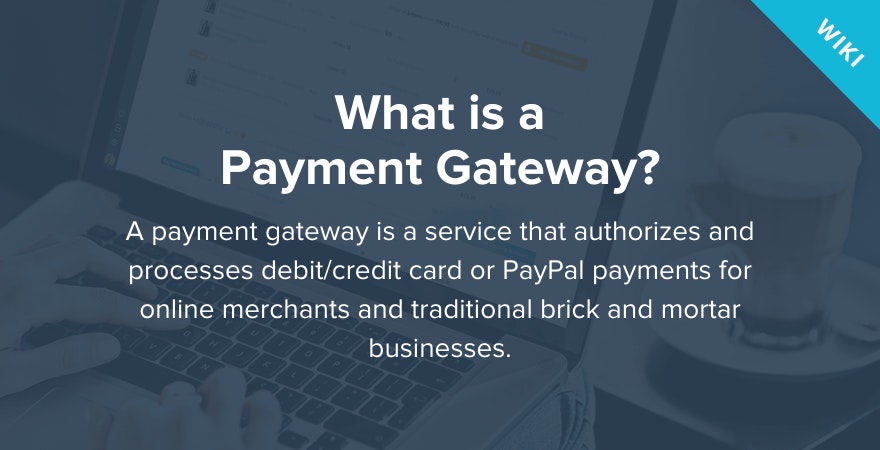
Payment Gateway



What is a Payment Gateway?
A payment gateway is a service that authorizes and processes debit/credit card or PayPal payments for online merchants and traditional brick and mortar businesses. A payment gateway facilitates these transactions by encrypting sensitive data and transferring it between a payment portal (a website or a mobile device) and the bank/front-end processor.
How Does a Payment Gateway Work?
Ultimately, payment gateways facilitate communication between your website or brick and mortar store, the payment processor, and the bank that issued the credit card being used to complete the purchase (or PayPal in case the PayPal payment method is used). Security is a major component of all payment gateways, therefore every transaction that occurs between the merchant and the issuing bank is encrypted to protect sensitive financial information.
Although the transaction process takes only a few seconds, several steps are accomplished during that brief window of time. Once the customer is prompted to a secure payment page and places an order, the transaction data (credit card number, CCV2 information, etc.) is encrypted and sent to your payment processor through the gateway. The payment processor communicates with the credit card’s issuing bank and retrieves feedback in a form of approval or a declined message. The response is then transmitted to the payment gateway, which communicates it to your website. Finally, the information is interpreted and an appropriate response is generated. If the transaction was approved, the merchant fills the order.
→ Click Here to Launch Your Online Business with Shopify
The Most Popular Payment Gateways
Being able to accept online payments is the only way for an eCommerce business to grow and expand its earning potential. At the same time, it’s important to understand that having the right mix of payment gateways in your store can also play a major role in generating revenue. Not having the right payment gateways available will most likely lead to cart abandonment and lost sales.
There are several popular payment gateways that customers recognize and trust, but you should also consider adding additional gateways that are less known internationally but are tailored to your target markets and countries. Different payment gateways are supported in different countries.
The most popular payment gateways you should consider for your online store include:
How to Choose the Right Payment Gateway for Your Online Store
With so many different payment solutions out there, deciding which payment gateways to integrate can be a drag. To ensure you’re making the right choice, ask yourself a few simple questions:
What is my target customer’s preferred method of payment?
It is well-known among eCommerce merchants that if they are unable to find their preferred method of payment, shoppers tend to cancel their purchase and look for the product elsewhere. It’s not uncommon for country markets to be dominated by local payment solutions. Doing a bit of research into your target market’s shopping habits and preferences, especially if a lot of your customers are based in foreign countries. This will help you determine which payment gateways should be made available on your online store.
How does this gateway affect my checkout user experience?
Making the checkout seamless and easy is key. By choosing the right payment gateways, you can actually reduce the number of steps during the checkout process by auto-populating some of the customer’s information through the gateway’s API and bringing the experience closer to a one-click checkout. Choosing less optimized payment gateways, on the other hand, can prolong the checkout process and increase the risk of drop-offs.
How easy is it to integrate with this payment gateway?
The last thing you want when integrating with payment gateways is to have to spend extra time and resources on creating a customized checkout experience. If you do go down that route, streamlining across all channels and all devices will become quite difficult and cost you some custom development work.
Will this gateway grow with my business?
Working with agile providers that keep up with market trends and constantly innovate will help your business cope with changing market conditions. You should also look into how the transaction fees will change in case your sales volume picks up.
Is this the most cost-effective option?
As you probably know, every payment gateway charges different transaction fees. Your goal when choosing the right payment gateway for your online store is twofold: to streamline the checkout process by integrating with the most commonly used gateways and to ensure that the costs incurred for every transaction don’t eat into your profit margins. For a quick and easy comparison, here are the commission fees charged by the most popular payment gateways:
- PayPal: $0.10 per transaction
- Stripe: 1.4% + 20p for European cards, 2.9% + 20p for non-European cards
- Square: 2.75% per swipe, dip or tap, 3.5% + 15¢ per keyed-in transaction
- SecurePay: 2.4% per transaction
- Worldpay: 2.75% + £0.20 (pay as you go)
- Authorize.net: 2.9% + 30¢ per transaction
- 2Checkout.com: 2.4% + 30¢ (UK), 2.9% + 30¢ (US); country-dependent
- Braintree: 1.9% + £0.20 for most transactions



Want to Learn More?
- Everything You Need to Know About PayPal and Other Payment Gateways
- What Is Dropshipping? It’s the Easiest Way to Start an Online Business!
- What Is ePacket Delivery?
- Case Study: International Dropshipping Vs. Dropshipping in the USA
Is there anything else you’d like to know more about and wish was included in this article? Let us know!